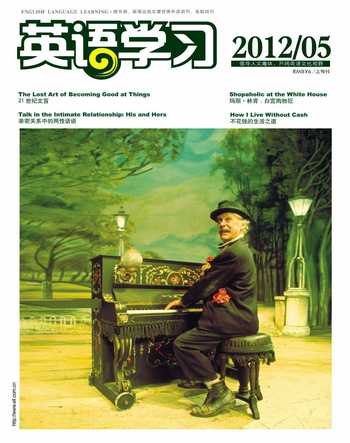不花錢的生活之道

In six years of studying economics, not once did I hear the word “ecology”. So if it hadnt have been for the chance purchase of a video called Gandhi in the final term of my degree, Id probably have ended up earning a fine living in a very respectable job. The little chap in the loincloth taught me one huge lesson—to be the change I wanted to see in the world. Trouble was, I had no idea back then what that change was.
After managing a couple of organic food companies made me realise that even “ethical business” would never be quite enough, an afternoons philosophising1 with a mate changed everything. We were looking at the worlds issues—environmental destruction, sweatshops2, factory farms, wars over resources—and wondering which of them we should dedicate our lives to. But I realised that I was looking at the world in the same way a western medical practitioner3 looks at a patient, seeing symptoms and wondering how to firefight them, without any thought for their root cause. So I decided instead to become a social homeopath4, a proactivist, and to investigate the root cause of these symptoms.
One of the critical causes of those symptoms is the fact we no longer have to see the direct repercussions5 our purchases have on the people, environment and animals they affect. The degrees of separation between the consumer and the consumed have increased so much that were completely unaware of the levels of destruction and suffering embodied in the stuff we buy. The tool that has enabled this separation is money.
If we grew our own food, we wouldnt waste a third of it as we do today. If we made our own tables and chairs, we wouldnt throw them out the moment we changed the interior decor. If we had to clean our own drinking water, we probably wouldnt contaminate it.
So to be the change I wanted to see in the world, it unfortunately meant I was going to have to give up cash, which I initially decided to do for a year. I got myself a caravan6, parked it up on an organic farm where I was volunteering. Cooking would now be outside—rain or shine7—on a rocket stove; mobile and laptop would be run off solar; Id use wood I either coppiced or scavenged to heat my humble abode.8
Food was the next essential. There are four legs to the food-for-free table: foraging wild food, growing your own, bartering, and using waste grub, of which there is loads. On my first day, I fed 150 people a three-course meal with waste and foraged food. Most of the year, though, I ate my own crops.
To get around, I had a bike and trailer, and the 34-mile commute to the city doubled up as my gym subscription. For loo roll Id relieve the local newsagents of its papers; its not double-quilted, but I quickly got used to it.
What have I learned? That friendship, not money, is real security. That most western poverty is of the spiritual kind. That independence is really interdependence. And that if you dont own a plasma screen TV, people think youre an extremist.
People often ask me what I miss about my old world of lucre and business. Stress. Traffic jams. Bank statements. Utility9 bills. Well, there was the odd pint of organic ale with my mates down the local.10

在學習經濟學的六年中,我一次也從沒聽過“生態學”這個詞。所以,如果不是在最后一個學期偶然買了盤名為“甘地”的錄像帶,我很可能會找到一份體面的工作并過上了好日子。但那個纏著腰布的小個子男人給我大大地上了一課:要想改變世界,先改變自己。但問題是,我那時還沒想好要改變什么。
在管理了幾家有機食品公司后,我意識到即使是“有道德的生意”也絕不足以改變什么。而某個下午我與一個同事的深入討論卻改變了一切。我們探討了很多世界性問題——環境破壞、血汗工廠、工廠化農場、資源爭奪戰——并疑惑我們應該為其中的哪項事業貢獻力量。但我意識到,我看待世界的方式跟西醫對待病人的方式一樣——看到癥狀,考慮如何醫治,而絲毫不去思考病根何在。所以我決定停止空談,成為一個社會順勢醫療者,一個先發制人的行動派,并調查這些癥狀的根源。
造成那些癥狀的其中一個關鍵原因就是:我們不用看到購買的商品對人、環境和動物造成影響的直接后果。消費者和商品之間的距離正變得越來越遠,以致于我們完全不知道所購買的商品(對環境等)造成的破壞有多么嚴重。而造成這種距離的工具正是由金錢。
如果我們自己親手種食物,我們就不會像今天這樣浪費掉三分之一的食物。如果我們親自制作桌椅,我們就不會在室內重新裝修時把它們扔掉。如果我們得親自凈化飲用水,我們可能就不會去污染水源。
所以為了做到“要想改變世界,先改變自己”,我必須得放棄金錢,并最初打算堅持一年時間。我給自己找了輛旅行拖車(作為住所),把它停放在一個有機農場里,而我是這個農場的義務勞動者。不論天氣好壞,做飯都只用外面的火箭爐做;手機和筆記本電腦要靠太陽能提供電力;我會用修剪下來或者撿來的木枝為我的陋室取暖。
食物是另一件必需品。我可以通過四種方法吃上免費食物:搜尋野味,自己耕種,以物易物以及(這兒多得是的)剩飯剩菜。第一天,我揀來的剩飯剩菜就夠150人吃了頓三道菜的“大餐”。不過,一年里的大部分時間我都是吃自己種的糧食。
為了出行,我有一輛自行車和一輛拖車,(我住的地方)距離城里有34英里,騎個來回就是我的健身方式。衛生紙我就用當地報紙,此舉可幫報刊經銷人減負;這種“衛生紙”并非雙層的,但我很快就習慣了。
我學到了什么?友誼比金錢更可靠。西方人最匱乏的是精神食糧。獨立意味著互相依賴。如果你沒有一臺等離子電視,人們會認為你是一個極端主義者。
人們常常問我,對于充斥著金錢和商業的舊世界,我會懷念什么。工作壓力。交通擁堵。銀行賬單和公共事業費。嗯,我會想念和伙伴們在酒吧偶爾喝到的一品脫有機啤酒。”
1.philosophise:〈主英〉=philosophize,哲學家似地思考(或推理),詳談。
2. sweatshop: 血汗工廠(工作條件惡劣而工資低微的小企業、工廠等)。
3. practitioner: 執業醫生。
4. homeopath:〈主英〉=homoeopath,使用(或提倡)順勢療法的醫生;“順勢療法”(homeopathy)是1796年哈內曼提出的一種有別于傳統西醫的治療學方法,其理論基礎是“同樣的制劑治療同類疾病”,意思是為了治療某種疾病,需要使用一種能夠在健康人中產生相同癥狀的藥劑。
5. repercussion:(尤指不好的)持續影響,反響,后果。
6. caravan:(帶有食宿設備的)旅行拖車。
7. rain or shine:〈口〉在任何情況下,不論天氣好壞。
8. coppice: 修剪(樹木)以助生長;scavenge:(人)在廢棄物中尋找(可食或可用的東西);abode: 住所。
9. utility: 公共事業(如煤氣、電力等)。
10. pint: 品脫(美國和英國的液量單位,尤用于啤酒或牛奶);ale: 麥芽啤酒。

